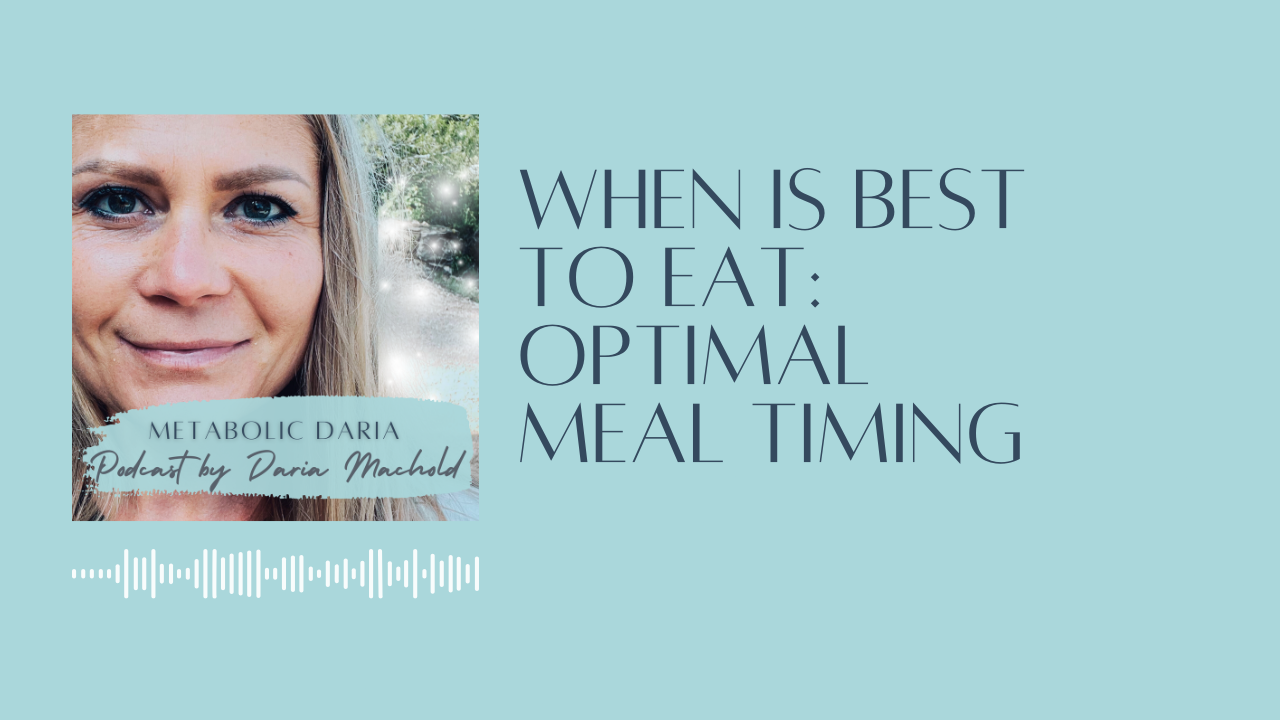
When is Best to Eat: Optimal Meal Timing
Most people are focused on what to eat and don't pay enough attention to the timing of eating.
You see, not only light exposure, but also food consumption tells our body it's daytime. That's why when people travel across many timezones, one of the things recommended is to eat in the morning at their destination, to reset their circadian rhythm.
We are not designed to be digesting food when it's dark outside. Because the hormone of darkness - melatonin, which is your main antioxidant, will not get released when you're digesting food. When you're digesting food your insulin is elevated to deal with the influx of glucose.
Melatonin will not get released when light is present, but it will also be blocked, when insulin is actively doing its job.
It just makes sense that our bodies will work optimally, when we're active during the day, getting light, getting food, digesting food. And then at night, our bodies are not digesting, they're resting and restoring, in complete darkness. This is how we've evolved, and this is what our bodies expect.
And by the way, melatonin needs 2-3 hours of darkness, BEFORE it gets released. Just a reminder, that you do need to pay attention to your light environment and dim the lights, in the 2-3 hours leading to bedtime.

Breakfast
Eat only when it's light outside. You can eat at sunrise or later. If you have trouble losing excess body fat, I would recommend to have a big protein and fat rich breakfast close to waking time (but only when the sun is out). This jumpstarts your metabolism, your body gets the signal of protein coming in - it can start making new tissues. Your body seeks protein to get the satiety message.
30 grams of protein, plus fat, maybe some greens or berries as well, if you wish - this kind of breakfast will signal satiety, keep you full until lunch and make it easy to avoid snacking.
Snacking is not great for most people, especially if you have excess body fat. Making long non-eating windows between meals is ideal.
Lunch
If you're hungry, eat a nutritious meal. If you're not, maybe wait and have an earlier dinner.
How many meals a day you should eat, will depend on your circumstances. An hard training athlete, who's trying to get in more calories than a non-athlete person, will probably need 4 meals a day, to fit in all the calories that they need.
A smaller person, who is trying to lose body fat, and who consumes 1500 calories a day, will not need more than 2 or 3. I find with clients who are in ketosis, that they can hardly eat more than 2 meals a day. The hunger is just not there.
Dinner
Eating a big dinner late, especially when it's dark outside, is definitely not a good idea. You will sleep so much better (and allow melatonin to do its restorative work, as I explained at the beginning), if you have an early dinner.
As we age, our stomach acid becomes less strong, and sleeping with a full stomach will mean for many people that they will wake up with partially undigested food in their system. That's not a good feeling to have.
Also, pay attention to how much fluids you drink with dinner. Waking up to have to use the bathroom can be avoided. A full night of uninterrupted sleep would be definitely preferable. Avoid drinking fluids after dinner, if possible.
Alcohol with dinner should be minimal as it definitely does affect sleep, even though it may help you fall asleep at first. Ideally, you want to stop alcohol consumption at least 4 hours before bedtime.
In Conclusion
You want to front load your food. Eat more for breakfast and lunch, and less for dinner. This will help you regulate your body's circadian clock.
Ideally, your eating window will fluctuate together with seasons. It should be shorter in winter, and longer in summer.
Physical activity before and after meals improves how nutrients from foods and drinks are handled by your body. If you cannot avoid working out in the evenings, you will have to have a bigger meal in the evening. That's just the reality of life nowadays. Stick to the rest of circadian principles as much as possible, in this case, starting with a correct light exposure.
Consume meals 3-6 hours apart, with no snacking.
Limit caffeine to before noon. In the afternoon switch to decaff coffee or herbal teas.

